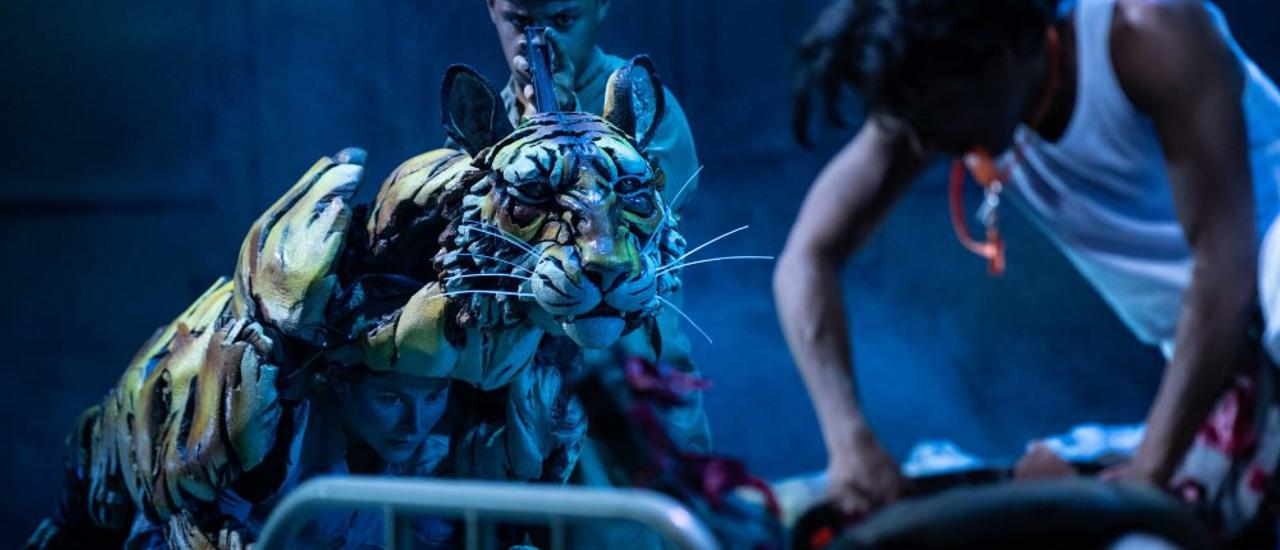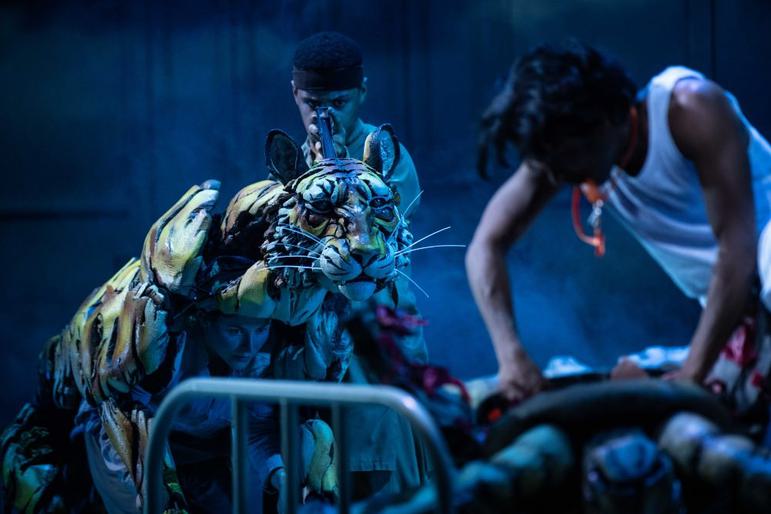 >
>News Story
When the team staging Life of Pi arrive at Chichester Festival Theatre, they will bring along their own physiotherapist – just like a visiting football team.
And the physio will have their work cut out for them. Life of Pi is the story of "Pi" Patel who finds himself lost at sea for 227 days in a lifeboat with only zoo animals for company.
One of them is Richard Parker, a 450-pound Royal Bengal tiger. To bring the enormous creature to life takes seven puppeteers – and they need to be at the peak of physical fitness.

The characters in Yann Martel's magic-realist novel include a hyena, a zebra and an orangutan, and it is set in the middle of the Pacific Ocean. Yet when she was asked to adapt it, playwright Lolita Chakrabarti jumped at the chance.
“I didn’t have any idea how amazing the puppets would be or how they would evolve, but in terms of representing animals, I knew puppetry would be the way.”
Even at the very earliest try-out, she had an inkling this was something special. Her instinct was right. From the first dress rehearsal at the Sheffield Crucible in 2019, the audience gasped and rose to their feet.
It duly raked in the five-star reviews. One critic called it “a triumph of transformative stagecraft”. Acclaimed runs in London and New York followed. Now, after the current 12-month tour of the UK, it has its sights set on Europe and Australia.
”There’s something about the story that brings people in,” says Chakrabarti. “That’s testament to Yann Martel’s universal truths. He’s talking about survival, loss, struggle, metaphorical shipwreck as well as real shipwreck, what keeps you going in life, faith, people and love. These are things that have affected everybody no matter where you’re from or what you’ve been through.”
Director Max Webster was similarly excited by the prospect of staging the Man Booker Prize-winning novel. “I’ve always been interested in putting impossible things on stage," he says.
You can stage anything: climbing a mountain or fighting a tiger in the middle of the Pacific Ocean. That also has a political link to the book: that imagination is possible and you can imagine a better society or a better world.
Max Webster, Director
In the theatre, the audience becomes part of the game of make-believe. “The show asks the audience to imagine along with it,” says Webster. "A puppet is not as realistic as CGI but, weirdly, because our imagination is involved, it’s like a hand being stretched out to us and the tiger becomes more real.”
Crucial in realising the ambitions of Chakrabarti and Webster is Finn Caldwell, the movement and puppetry director, who previously worked on War Horse and Running Wild. Like playing a musical instrument, the puppeteers must follow a tightly choregraphed physical score, making it their own as they master it. To bring a tiger to life, they must focus on every pulse, breath and muscle movement.
“There’s a story for the animals that runs like an undercurrent to the script,” says Caldwell. “We need to know precisely the physics of each moment – this paw hits the face and does this – but also every twitch of its paws, every flick of its tail is communicating some kind of thought or emotion.”
Now with the cumulative experience of its runs in Sheffield, London and New York, Life of Pi is as good as it has ever been.
“Audiences around the country will get to see something every bit as exciting as the show that was in the West End,” says Webster. “It’s a brilliant cast and a brilliant team and the spectacle is still going to be there. I’m thrilled we’ve been able to maintain the integrity of the show while bringing it to all these beautiful places.”
Interview feature by Mark Fisher
Life of Pi comes to Chichester from 16 November - 2 December. Tickets from £10.
Go full circle
Our Supporters and Patrons Circles are a group of super-engaged theatre-lovers who want to see CFT thrive. Join a circle and you'll have the chance to go behind the scenes, hear from the Director, sit in on rehearsals and meet the cast. You'll get closer to our work, hear stories and share experiences to remember forever.


